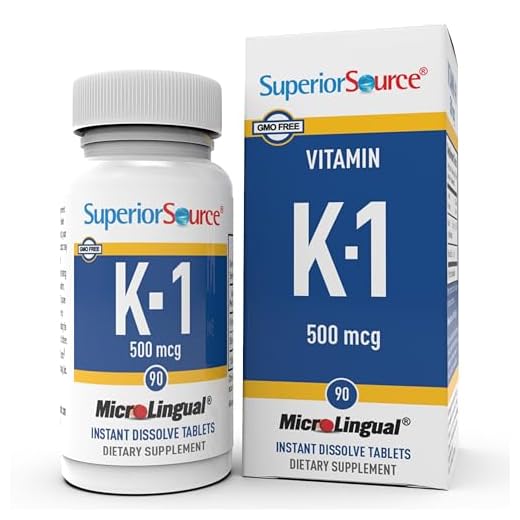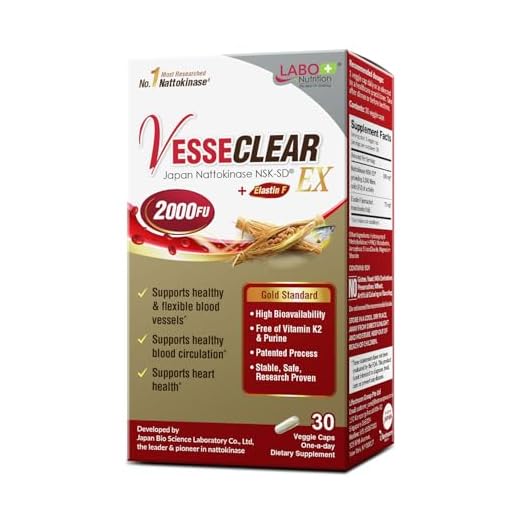







Vitamin K1 plays an essential role in maintaining healthy blood vessels by regulating calcium metabolism and preventing arterial calcification. It activates proteins that help bind calcium, supporting both vascular and bone strength. A higher intake of Vitamin K1 is linked to lower risks of coronary heart disease and arterial stiffness, enhancing blood flow and circulation. Additionally, it has anti-inflammatory properties that protect endothelial function. You can easily boost your Vitamin K1 levels by including green leafy vegetables in your diet. There's more to discover about this vitamin's benefits and how to optimize your intake.
Key Takeaways
- Vitamin K1 regulates calcium metabolism, preventing harmful arterial calcification and promoting vascular health.
- It supports the synthesis of matrix Gla-protein (MGP), which inhibits vascular calcification and enhances blood vessel integrity.
- Higher vitamin K1 intake is linked to reduced inflammation markers in arteries, contributing to better cardiovascular function.
- Adequate vitamin K1 enhances endothelial function, improving blood flow and overall circulation in the body.
- A diet rich in vitamin K1 from green leafy vegetables is associated with lower risks of coronary heart disease.
Overview of Vitamin K1
Vitamin K1, also known as phylloquinone, plays an essential role in maintaining your vascular health. This important nutrient is primarily found in green leafy vegetables and is critical for synthesizing proteins necessary for blood coagulation. By supporting this process, Vitamin K1 helps guarantee that your blood vessels remain healthy and functional. In addition, it contributes to bone health by activating osteocalcin, which aids in calcium binding, significant for maintaining the strength of blood vessel walls.
Additionally, Vitamin K1 aids in calcium regulation within your blood vessels, playing a significant role in preventing arterial calcification. If calcium accumulates in your arteries, it can lead to cardiovascular diseases. Higher dietary intake of Vitamin K1 has been linked to lower hospitalization rates for heart disease, highlighting its protective effect on vascular health.
Another important function of Vitamin K1 is its contribution to the production of matrix Gla-proteins (MGP). These proteins inhibit vascular calcification and help maintain the elasticity of your blood vessels. Consistent intake of Vitamin K1 is essential for you to maintain ideal cardiovascular function and overall vascular health. Including green leafy vegetables in your diet is an excellent way to guarantee you're getting enough Vitamin K1 to support your vascular system effectively.
Role in Blood Vessel Health
Maintaining healthy blood vessels relies heavily on the role of Vitamin K1 in regulating calcium metabolism. This crucial nutrient helps prevent arterial calcification, ensuring that your blood vessels remain flexible and strong. Adequate dietary intake of Vitamin K1 is linked to a lower risk of coronary heart disease, as it supports the integrity of blood vessel walls. Moreover, Vitamin K1 is essential for synthesizing proteins involved in blood coagulation, which plays a role in overall cardiovascular health its significance for blood clotting.
One of the fundamental functions of Vitamin K1 is its involvement in synthesizing matrix Gla-protein (MGP), which actively inhibits vascular calcification and protects against arterial stiffness. Additionally, studies show that higher dietary intake of Vitamin K1, particularly from leafy greens, is associated with reduced markers of inflammation in arteries, contributing to improved cardiovascular function.
Consistent consumption of Vitamin K1-rich foods may also enhance endothelial function, promoting better blood flow and circulation. By incorporating these nutrient-dense foods into your diet, you're taking a proactive step towards better blood vessel health. In summary, Vitamin K1 is crucial for maintaining the elasticity and overall functionality of your blood vessels, making it a key player in cardiovascular wellness.
Mechanisms of Action
The mechanisms by which K1 supports blood vessel health are multifaceted and fundamental for cardiovascular function. One of the key roles of Vitamin K1 is in the synthesis of matrix Gla protein (MGP), which actively prevents arterial calcification. By promoting the carboxylation of specific proteins, K1 enhances calcium binding, facilitating effective calcium regulation within blood vessels. This process is essential for maintaining vascular health and preventing stiffness, and it aligns with the importance of Vitamin K in overall wellness.
Adequate dietary intake of Vitamin K1 has been linked to lower arterial stiffness, contributing to improved cardiovascular function. Studies indicate that higher levels of K1 in your diet correlate with a reduced risk of coronary heart disease and lower hospitalization rates for heart-related conditions.
Moreover, Vitamin K1 exhibits anti-inflammatory properties that help maintain endothelial function, fundamental for the integrity of your blood vessels. By supporting these mechanisms, K1 not only aids in the prevention of arterial calcification but also guarantees that your cardiovascular system operates at its best. Consequently, assuring sufficient dietary intake of Vitamin K1 can play a significant role in enhancing your vascular health and overall cardiovascular well-being.
Sources of Vitamin K1
Green leafy vegetables are the primary sources of Vitamin K1, making them crucial for your daily intake. Foods like kale, spinach, and broccoli are packed with this essential nutrient and should be staples in your diet. Other significant sources of vitamin K include Brussels sprouts, lettuce, green beans, and various herbs such as basil and thyme.
While these vegetables are excellent sources of vitamin K1, don't overlook the contribution of vegetable oils, particularly soybean and canola oil. These oils can enhance your overall intake of vitamin K1 and are often used in cooking. It's worth noting that pairing vitamin K-rich foods with dietary fats can improve the absorption of this nutrient, making it even more beneficial for your body.
For adults, the Recommended Dietary Allowance (RDA) for vitamin K1 is 90 micrograms for females and 120 micrograms for males. This emphasizes the importance of including a variety of these foods in your balanced diet to meet your daily intake needs. By incorporating a range of sources of vitamin K1, you'll be supporting not just your blood vessel health but also your overall well-being.
Recommended Intake and Dosage
Including a variety of vitamin K1 sources in your diet is essential for supporting your vascular health. The recommended intake of vitamin K1 is 90 micrograms for adult females and 120 micrograms for adult males. Meeting these daily requirements helps improve arterial health by preventing arterial calcification and promoting the elasticity of your blood vessels.
Most people can achieve their vitamin K1 needs through a balanced diet rich in green leafy vegetables like kale, spinach, and broccoli. Research shows that higher intakes of vitamin K1 are associated with lower rates of heart disease hospitalization, highlighting its protective role for your blood vessels.
If you're on anticoagulant therapy, such as warfarin, it's vital to maintain a consistent vitamin K1 intake within the recommended range of 90-120 micrograms per day. This consistency aids in effectively managing your blood vessel health while on medication.
Risks and Considerations
Maintaining a healthy intake of vitamin K1 is vital, but there are several risks and considerations to keep in mind. While vitamin K1 plays an important role in blood vessel health by aiding in calcium regulation and preventing vascular calcification, those on anticoagulant medications, like warfarin, must be particularly cautious. A consistent dietary intake of vitamin K1 is necessary to guarantee that clotting processes remain stable and effective, as fluctuations can lead to serious health issues.
Moreover, while higher dietary intake of vitamin K1 is linked to lower arterial stiffness and a reduced risk of coronary heart disease, excessive intake might also pose risks. If you have underlying health conditions or are taking certain medications, it's important to consult with a healthcare provider before greatly increasing your vitamin K1 consumption. Unmonitored changes could inadvertently raise cardiovascular risk by affecting how your body regulates calcium in the blood vessels.
Conclusion
Incorporating vitamin K1 into your diet can greatly benefit your blood vessel health, especially when you consider its role in maintaining elasticity and preventing calcification. You might find it surprising that a simple leafy green salad could be the key to enhancing your cardiovascular wellness. As you enjoy these foods, remember that a balanced intake guarantees you're not just nourishing your body but also actively supporting your vascular system. It's a small change that can lead to remarkable health benefits.





